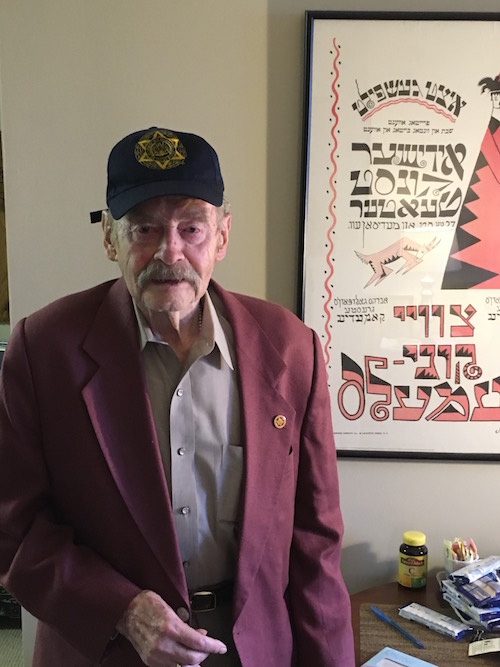
George Oscar Lee survived the German invasion of Poland, six months in a Soviet prison and many more in combat in World War II with a Polish regiment of the Soviet army — but a horse nearly killed him.
During the war, Lee was traveling by horseback near the central Russian city of Sverdlovsk, now known as Yekaterinburg.
“It was winter and the water was frozen,” Lee said. “The weight of the horse, weapons and me fell through the ice. The horse went to shore.”
Lee nearly drowned.
“I grabbed the horse’s tail and it pulled me out,” he said.
Lee, a 93-year-old resident of North Hills, was honored by the Manhasset-Lakeville Fire Department in November for not only surviving the war but performing a service immediately afterward: he formed a fire brigade at the Föhrenwald displaced persons camp in Bavaria, Germany.
“It was a pretty humbling ceremony,” said Brian Stone, deputy chief of the Manhasset-Lakeville Fire Department. “I was honored to be there with our members as well as a truck.”
Though Lee’s effort to start a Föhrenwald fire brigade has garnered some attention, few know about the perils that preceded that achievement or the promise of a new life in the United States that followed it.
Lee was born in 1924 in the Polish town of Drohobycz, now part of Ukraine.
As a young Jew, he fled east to the Soviet Union in 1939, soon after Nazi Germany invaded Poland.
Two years later, at age 17, he was put in Soviet jail for unknown reasons, likely because someone had reported him as a dissident.
“The Russian police were shrewd,” he said. “They didn’t give you much to eat, and they moved you constantly from point A to point B.”
Six months later, the Soviets let him out of prison on the condition he join a Polish anti-artillery regiment in the Soviet army.
“They put me in charge because I had an education,” he said. “And I could speak both Polish and Russian.”
His regiment fought throughout Eastern Europe.
Finally, in 1945, Lee’s regiment was part of a force that liberated the Polish city of Warsaw.
“It was a fantastic feeling,” he said. “We greeted the Polish population. Women kissed us. One beautiful girl invited me for Christmas.”
Soon after liberation, Lee was in the Föhrenwald displaced persons camp in Germany.
“All of a sudden one day a person in the camp was yelling, ‘Fire! Fire! Fire!'” he recalled. “I put it out. I asked if they had a fire department and they said, ‘no.’ I decided to start one.”
“It changed my life,” he added.
The fire department gave him a focus as he filed for and awaited admission into the United States, he said.
In 1947, he finally came to the United States. His wife, Gisella, the sole survivor in a family of 32, had arrived already.
“It’s easy to adjust to the good life,” he said of his first few years living in the Bronx.
He began working as a salesman for a paper goods company, which supplied products to stationery and toy stores.
“I always had a smile,” he said. “Life was good after all that I’d seen.”
Then, in the mid-1960’s, he became vice president of sales for Polymer Research Corp. of America, which supplied chemical and related materials to the textile industry.
He worked at that position until his retirement in 1994, when he moved to Aventura, Florida, and enrolled in creative writing courses at Florida International University. Since then, he has written two collections of short stories and three novels, which are set in Europe during World War II.
A year and half ago, Lee moved to Bristol Assisted Living in North Hills, bringing him back to the region where he arrived as a refugee in 1947.
Asked about President Donald Trump’s executive order suspending refugee admission, Lee said, “I hate the idea, very simply.”
He expressed appreciation for the liberties he enjoyed after coming to the United States.
“There’s nothing like it to live like free man,” he added. “Educate your kids; not be afraid to walk at night; aways say what is on your mind without being afraid someone will arrest you.
“The price of liberty is very high. It’s worth keeping it free.”






